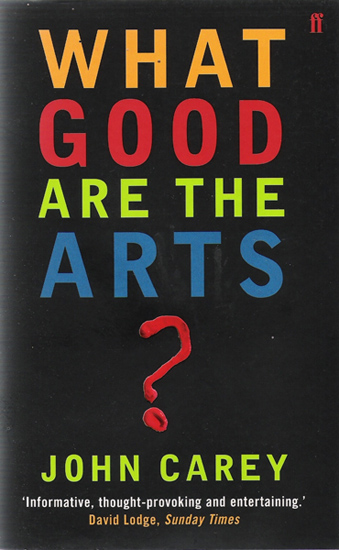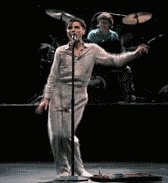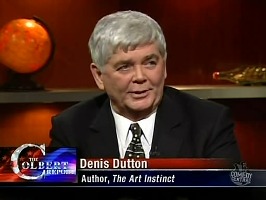
I was sitting at a surprise birthday party for my friend Rhonda yesterday. I found myself in conversation with a teacher from Hope. As we chatted I realized that we had a love of poetry in common. I somehow wanted to tell him. But I was reluctant due to previous futile attempts to connect with professors around my interests. But I overcame my introverted predilections and mentioned it to him. We then had a conversation around books and poetry that I found very enjoyable.

Part of being an introvert is the way conversations like this drain me in retrospect. I have to convince myself that I wasn’t too chatty and didn’t dominate the conversation with my passionate talk. Sheesh.

I have now reached the chapter entitled, “Amateurs!,” chapter nine in How Music Works by David Byrne. I note that this is a chapter that he footnotes more than the others. He quoted from John Carey’s grumpy little book, What Good are the Arts?

Carey apparently has written a exposition that treats an elitist approach to the arts as a bad thing. This might be needed where he lives. But where I live, people barely are interested in what used to be thought of as high art.

Jupe the introvert thinks twice before mentioning his love of poetry or Proust or Bach or Buxtehude. My passions seem not only to be antiquated but evidence of some sort of inherent snobbery and elitism. Weird.

I like Denis Dutton’s response to Carey’s book (which he still says can be fun to read):
What good are the arts? Here’s one stab at an answer. They provide us with powerful pleasures. They expand our imaginative sense. The are windows into historical epochs and into realms of pure fancy and fantasy. They sharpen our intellectual discriminative powers and, for example in music, develop human technical capacities to the highest degree possible. The arts incite emotional experience of an intensity and variety nowhere else available and take us deeply into alternative human sensibilities. They can increase human sociality, for artistic performers and their audiences alike. They record what are some of the most profound ideas human beings have ever had, but unlike advanced science do it in a way that ordinary mortals can understand.
Byrne really doesn’t evidence interest in Carey’s ideas or at least not yet. He quotes Carey quoting Ellen Dissanayake who is doing some interesting thinking around evolution and the arts.

She has her own website. I note with amusement that one of her recent articles (unlinked on her site) is “Denis Dutton: Appreciation of the man and discussion of the work. ” Philosophy and Literature 2014 38:1.
And Dutton does mention her as a bit of lucidity in Carey’s book. How about that?
Anyway, Byrne is full of hilarious and outrageous quotes.

I do enjoy reading his thoughtful reflections from a specifically commerical popular musician’s point of view.
“Of all the arts, music, being ephemeral, is the closest to being an experience more than it is a thing—it is yoked to where you heard it, how much you paid for it, and who else was there.” p. 267 HOW MUSIC WORKS
Good grief. How much you paid for it?
